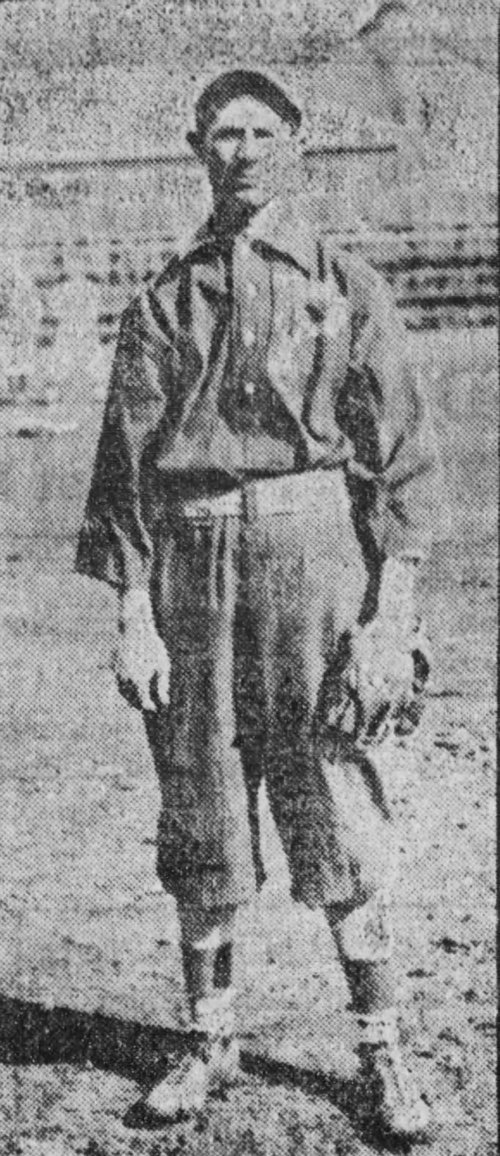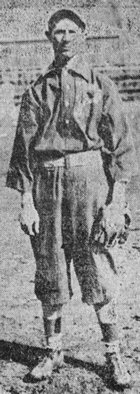Hugh Garrity
| Date and Place of Birth: | September 26, 1886 Los Angeles, CA |
| Date and Place of Death: | September 27, 1918 Mars-sur-Allier, France |
| Baseball Experience: | Minor League |
| Position: | Outfield/Pitcher |
| Rank: | Private First Class |
| Military Unit: | Company E, 26th Engineers AEF |
| Area Served: | France |
Hugh Garrity - the son of Patrick and Hannah
Garrity, who were both from Ireland – was born in Los Angeles,
California on September 26, 1886. Sometime before 1909, Garrity’s mother
died, and his father, who had served with the 6th New York
Heavy Artillery during the Civil War, was admitted to the Sawtelle
Veterans Home.
Garrity loved baseball and played every opportunity
he got. He possessed an outstanding throwing arm which saw him play as
both an outfielder and a pitcher. He first played semi-pro baseball with
the Eastsiders in Los Angeles, then worked on the San Pedro, Los Angeles
and Salt Lake Railroad, playing for the company baseball team in Salt
Lake.
In March 1909, Garrity had a tryout with Portland
of the Pacific Coast League at their San Luis Obispo spring training
camp, but was released and returned to Los Angeles to play semi-pro ball
with the Maiers Brewery team. However, Maiers didn’t have his services
for long as the 24-year-old moved to Bakersfield and played for the
Merchants in the San Joaquin Valley League, helping them clinch the
league title. He did, however, return to play late-summer ball with
Maiers and also played winter ball for the Bakersfield Santa Fe railroad
team.
In 1910, Garrity was employed at the Bakersfield
Iron Works, but left to play professional baseball as the Bakersfield
Drillers assembled their team for the inaugural season of the 4-team San
Joaquin Valley League as a Class D minor league. Garrity helped the team
clinch the league title with a 21-9 record.
Events took a very unusual turn in March of that
year. Whilst still employed at the Bakersfield Iron Works, he was
charged with having assaulted a non-union employee of the iron works.
Garrity supposedly broke the other man’s jaw. He was deemed an
“undesirable citizen” by the merchants’ committee of Bakersfield and
instructed that “it would help the situation for him to depart from
Bakersfield.” Failing to leave town, 24 armed and deputized merchants
entered the “troublemaker’s” room at a local lodging house on March 19,
1911. Garrity was escorted to the Southern Pacific (Kern) Depot and
placed on the southbound Owl passenger train to Los Angeles.
Garrity was umpiring semi-pro games in Fresno when
he was asked to join the Tulare Merchants of the San Joaquin Valley
League in May 1911 (Bakersfield didn’t field a team in the league that
year, which is probably just as well). However, the Tulare team, along
with the Porterville Orange Pickers, left the league in July. Garrity,
now 24, went to work as a blacksmith helper with the Kern Trading and
Oil Company (K. T and O). He continued to play baseball with the Tulare
team in 1912, who were back in the San Joaquin Valley League although it
was no longer recognized as a minor league. He was also the captain of
the K. T and O team in the West Side League for 1912 and 1913. He played
for the K. T and O team at Kerto in 1914 through 1916, playing winter
ball for the Taft All-Stars. By this time, Garrity was a familiar and
well-liked face all over the oil fields of Central California.
On April 6, 1917, the United States joined its
allies - Britain, France, and Russia - to fight in World War I against
Germany. Thirty-year-old Garrity registered for military service in June
and entered service with Company E of the 26th Engineers
(Water Supply) in December 1917.
The 26th Engineers was composed mostly
of Californians from Kern and Fresno counties. They arrived in the ice
and snow at Camp Dix in Trenton, New Jersey on January 7, 1918, after a
2,900-mile railroad journey via Ogden, Cheyenne, Omaha and Chicago.
After completing their training at Camp Dix, Garrity and the engineers
left for Europe in August 1918.
Company E had been in France for just a few days
when Private First Class Garrity died of pneumonia on September 27,
1918. The day after his 32nd birthday. The tragic news was
expressed in a cablegram that was received by his sister, Josephine
Acevedo, in mid-October 1918.
Hugh Garrity was buried at the American
Expeditionary Forces Hospital Center cemetery at Mars-sur-Allier,
France. He was disinterred and reburied at the Nevers Communal Cemetery
in Nievre, France on June 15, 1919. He was disinterred again on October
21, 1920, and shipped from the port of
St. Nazaire on board the USAAT Wheaton to Hoboken, New Jersey,
eventually arriving in California in January 1921, where he was buried
with full military honors at the Calvary Cemetery, Los Angeles,
following a ceremony at the Plaza Church of Our Lady of the Angels.

Date Added May 9, 2020
Baseball's Greatest Sacrifice is associated with Baseball Almanac
Baseball's Greatest Sacrifice is proud to be sponsored by

